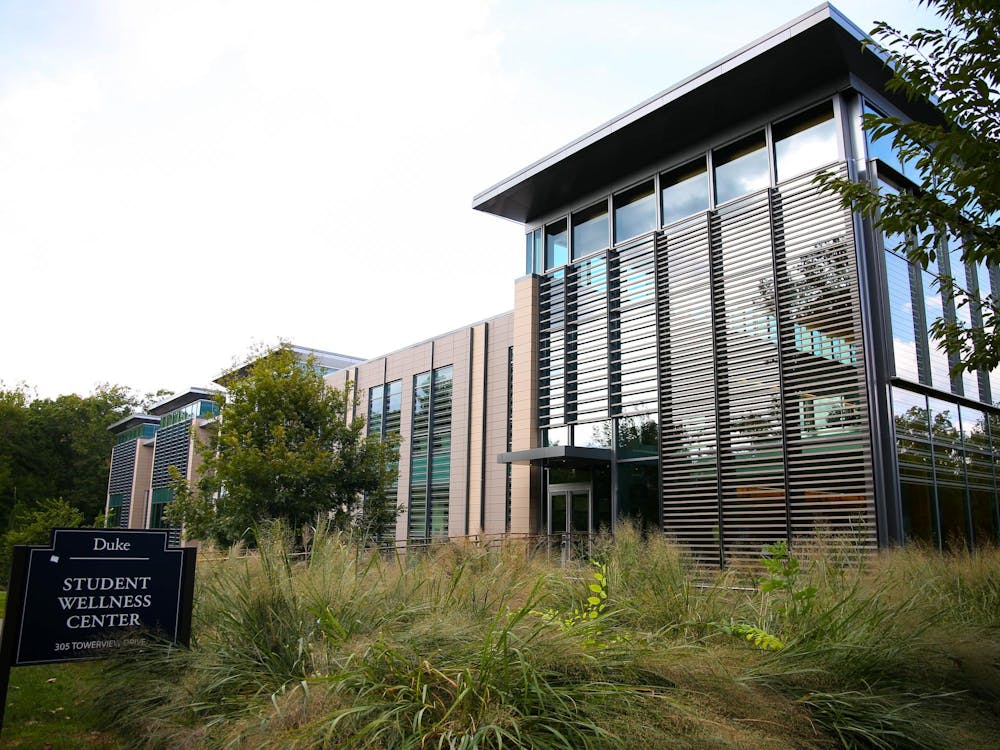As opioids like fentanyl increasingly cause overdose deaths across the country, how is Duke responding to keep students safe?
DuWell and student groups such as Duke Overdose Prevention Efforts are seeking to spread awareness about drug overdose prevention and response and make emergency care readily available.
“It's been tremendous progress, and I hope to see it keep going,” said sophomore Pranav Mukund, an intern at DuWell.
The opioid epidemic
In a study by the Centers for Disease Control and Prevention, a 317% increase in the psychostimulant-involved death rate was observed from 2013 to 2019. Furthermore, 107,622 overdose deaths were reported in 2021, 72 to 80% of them involving opioids.
Another study by the CDC reported 220 daily deaths in 2021 due to opioid overdose.
“The issue of substance use on college campuses is a growing concern,” wrote DuWell Associate Director Sara Campbell in an email to the Chronicle. “… Duke students do report a higher history of at least one-time use of particular illicit substances.”
One common way people are susceptible to opioids is when drugs like fentanyl are laced in other substances such as cocaine. If students are unaware, they can accidentally overdose on opioids quickly, if experimenting with such substances.
Spreading the word
Naloxone, also known by its brand name Narcan, is a nasal spray that reverses opioid overdose effects quickly and temporarily in an emergency situation before the patient can receive further medical attention.
Recovery meetings, recovery coaching and harm reduction education are also offered by DuWell, responding to general problems with substance use.
Additionally, DuWell has hosted training sessions in the Wellness Center on how to mitigate an opioid overdose with Narcan.
“We train people on how to use Narcan, the specific timing, when you should give it [and] the symptoms of overdose,” Mukund said.
Campbell wrote that DuWell has trained 294 students on how to administer Narcan and another 301 on “national concern and harm reduction strategies.”
“After our first training with Sara Campbell, the Duke campus center pharmacy sold out in Narcan,” said junior Eddie Scott, a founder of DOPE.
Outside of these trainings, DuWell and DOPE are planning future Quad trainings hosted by students, with the goal of educating at least 20% of students in each residence hall.
Scott believes that student-led training, as well as student groups such as DOPE, can cause widespread engagement among students.
“Seeing your classmate in the Quad with a table calling you over, asking you to come do this training is very motivating,” he said.
Help within reach
Currently, another major goal that both organizations have is making Narcan readily available for students at all times.
Get The Chronicle straight to your inbox
Sign up for our weekly newsletter. Cancel at any time.
During the DuWell training sessions, overdose kits have been distributed to participants.
“The kits don't actually have Narcan in them,” said Mukund. “But they have all the equipment that you need to resuscitate someone in case they're having an overdose.”
Although the DUPD and Duke Campus Center Pharmacy are both working to secure student access to Narcan, Student Affairs is working to allow Narcan to be distributed to students, as well as placing Narcan and Narcan usage instructions throughout residence halls, according to Campbell.
“It involves collaboration between various offices, with the ultimate goal of maintaining sound, evidenced-based practices,” Campbell wrote. “All of this must be balanced with state guidelines related to standing orders and distribution orders of Naloxone.”
DuWell also plans to have stickers that students can put on their dorm doors signifying that they have Narcan, to increase the chances of obtaining Narcan nearby.
“In the case of an emergency, people can knock and get the drug if needed,” Mukund said.
How students can prepare
Campbell, Mukund and Scott recommend various actions that students can take to protect themselves and the people around them.
A culture of transparency and open communication surrounding substance use and substance overdose is needed to protect students, according to Campbell. Whether this means ensuring that a sober peer is nearby to respond to a possible overdose or communicating with a struggling peer, Campbell says responsible substance use must be prioritized over stigmas.
Mukund pointed out that students may hesitate to help others out of fear of punishment, not knowing that laws have been established to prioritize student health and safety.
He emphasized that students who seek medical assistance for themselves or others during an overdose situation, as well as the overdose victim, would generally be shielded from prosecution through North Carolina’s Good Samaritan Law and from disciplinary action through Duke’s amnesty policies.
Scott says that it is also important to remember that an overdose can truly happen anytime and can happen to anyone, according to Scott.
“Adderall, a drug that can be taken in an academic setting … can be fatal if it's laced with fentanyl,” he said.
Winston Qian is a Pratt sophomore and health/science editor for the news department.

